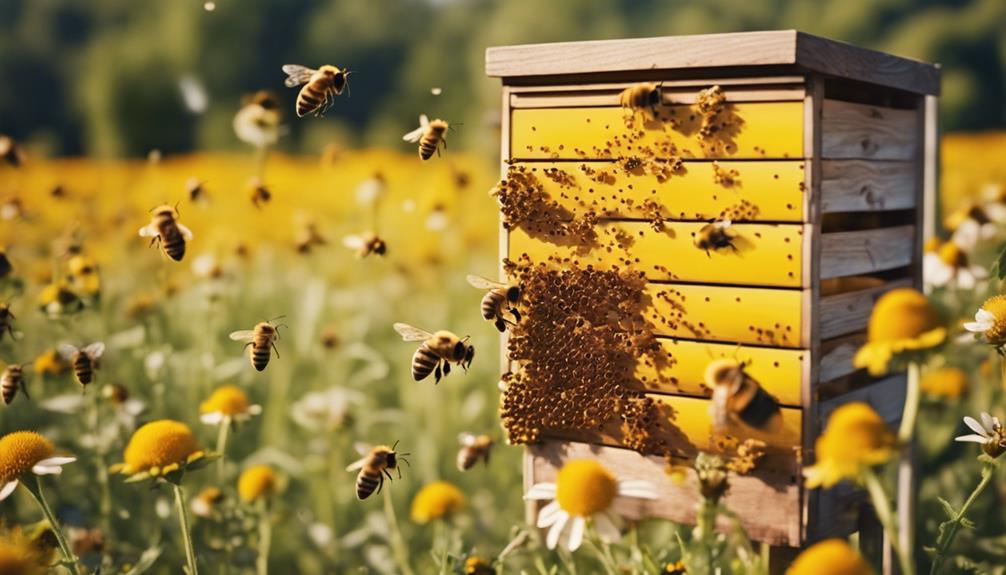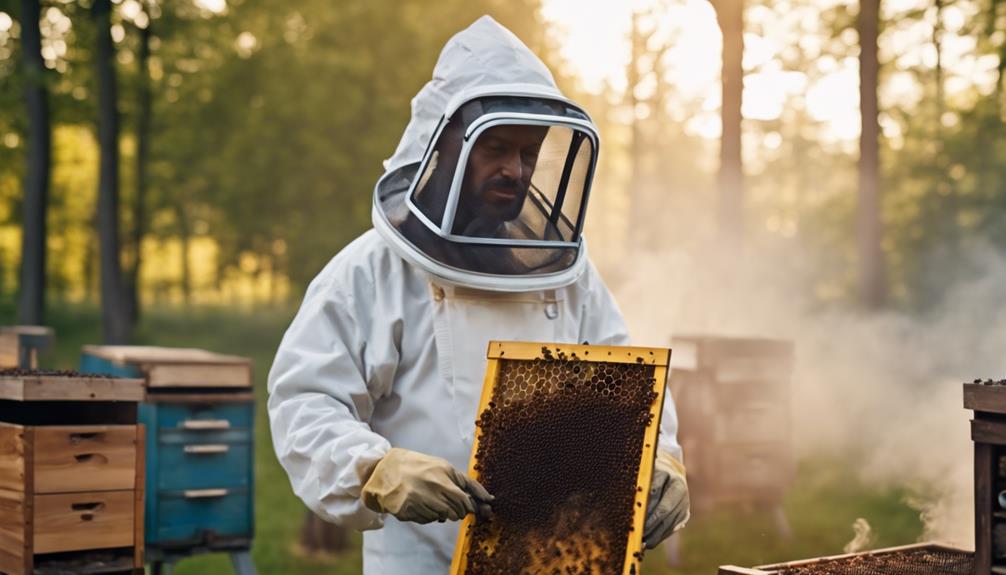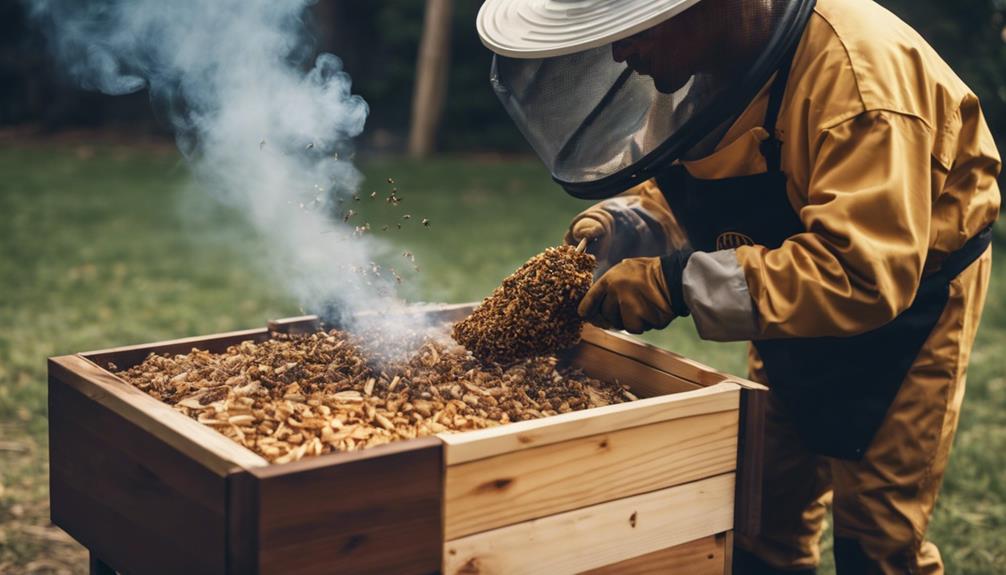Ethically sourced honey can be a part of a vegan diet if prioritizing bee welfare and sustainable practices. Some vegans opt for honey from sources that uphold ethical beekeeping practices, focusing on the well-being of the bees. While there are concerns like artificial insemination of queens, supporting small-scale beekeepers who align with vegan values can be a step towards ethical honey consumption. By emphasizing transparency in sourcing and making informed choices, ethical honey can be a guilt-free option for vegans conscious of bee welfare. Join us to discover more about the intersection of veganism and honey choices.
Main Points
- Ethical sourcing of honey may align with some vegan values.
- Supporting small beekeepers can contribute to bee welfare.
- Transparency in production methods aids informed consumer choices.
- Personal values guide whether ethically sourced honey is acceptable.
- Vegan alternatives like agave and maple syrup offer exploitation-free options.
Ethical Considerations of Honey Consumption
Why do vegans carefully consider the ethical implications of consuming honey?
The discussion in veganism regarding honey focuses on the treatment of bees in commercial production. Some vegans choose honey from ethical sources, where bee welfare is a priority. The concern lies in practices like artificial insemination of queen bees commonly found in large-scale beekeeping operations.
However, honey from small-scale beekeepers who take a more hands-off approach may align better with vegan values. It’s all about ethical sourcing and making informed choices that resonate with our principles.
Bee Welfare in Honey Production
Considering the ethical implications of honey consumption leads us to examine the critical aspect of bee welfare in honey production. Ethical beekeeping practices prioritize bee health, avoiding harmful procedures like wing clipping and artificial insemination. Beekeepers who prioritize bee welfare collect excess honey in spring, ensuring the colonies have enough food reserves.
Small-scale beekeeping operations often treat bees with respect, minimizing stress on the colonies. In contrast, commercial beekeeping for honey production may compromise bee health by using less nutritious sugar substitutes. The origin of honey plays a significant role in bee welfare, with ethical sourcing ensuring proper bee welfare practices.
Understanding these distinctions can guide consumers towards supporting sustainable and bee-friendly honey production methods.
Vegan Perspectives on Honey Consumption
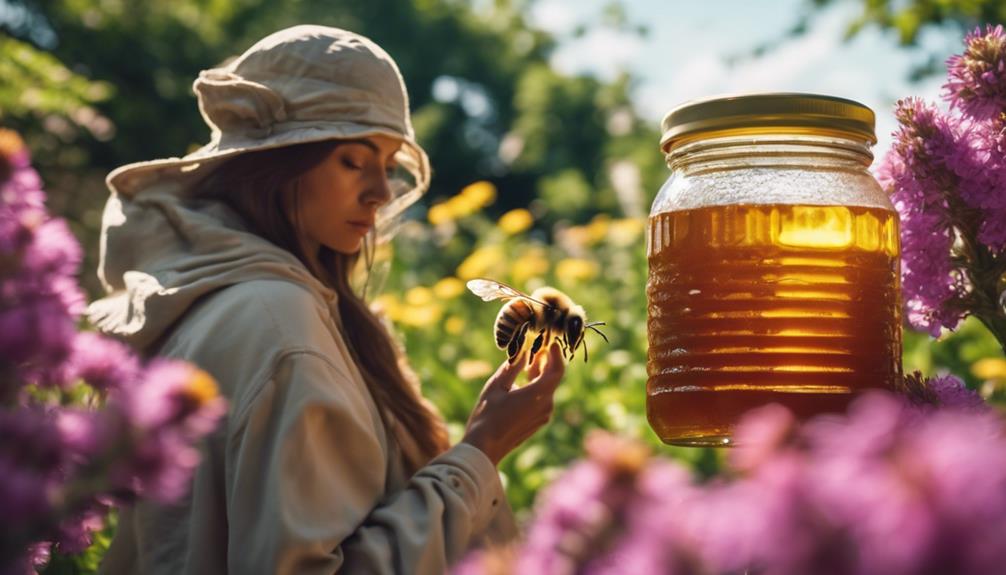
Exploring vegan perspectives on honey consumption reveals varying views on ethical beekeeping practices and their alignment with vegan beliefs. Some vegans may find consuming ethically sourced honey from small-scale beekeepers who prioritize bee welfare acceptable. This approach considers the ethical dilemma surrounding honey consumption as a subjective dilemma that depends on personal values and informed decisions.
While some vegans choose to avoid honey altogether due to concerns about bee exploitation, others believe that supporting ethical beekeeping practices can be in line with their vegan values. Ultimately, the decision to consume ethically sourced honey is a personal one, influenced by individual beliefs and the desire to make informed choices that resonate with one’s values.
Benefits of Ethical Honey Sourcing
Discussing the benefits of ethical honey sourcing sheds light on the positive impacts of supporting small beekeepers who prioritize bee welfare and sustainable practices. When we choose ethically sourced honey, we contribute to maintaining biodiversity and supporting local ecosystems.
By backing small-scale beekeepers, we promote transparency in beekeeping practices and guarantee the well-being of bee populations. These responsible beekeepers often use natural methods that benefit bees and minimize environmental impact.
Opting for ethically sourced honey fosters a more sustainable approach to honey production, where bee welfare is a top priority. It’s heartening to know that our choice not only benefits us but also helps protect these crucial pollinators and the environment they thrive in.
Challenges in Ethical Honey Production
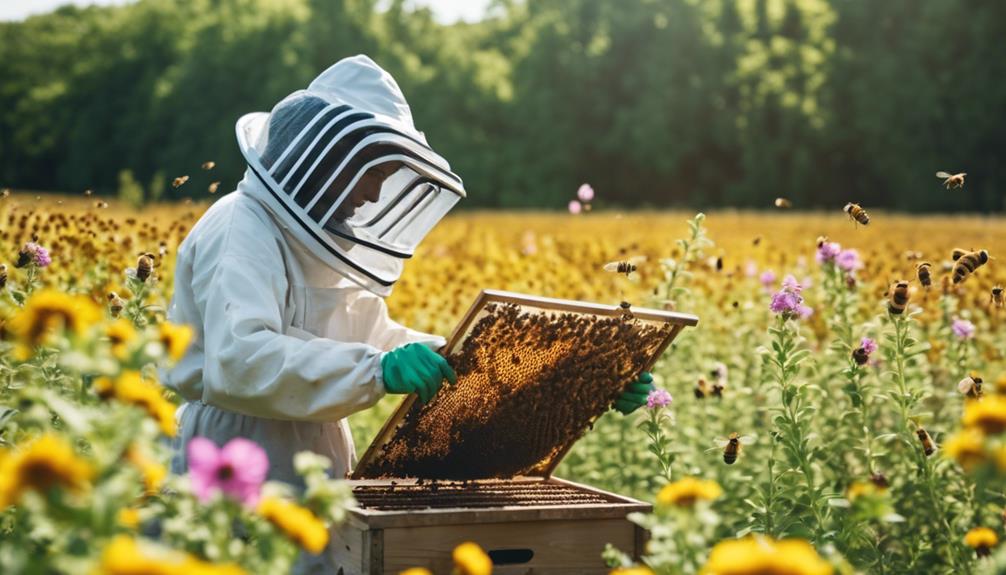
Traversing the landscape of ethical honey production presents various challenges for consumers and beekeepers alike. Ensuring bee welfare and upholding ethical practices in honey production can be labor-intensive and require transparent beekeeping methods.
The absence of standardized guidelines in the industry makes it tricky for consumers to distinguish truly ethical sources. Beekeepers face the demanding task of maintaining ethical standards while also meeting the demands of honey production.
Striking a balance between honey harvesting and prioritizing bee welfare necessitates industry transparency and a commitment to ethical beekeeping practices. These challenges highlight the complexities involved in ethically sourcing honey and underscore the importance of supporting beekeepers who prioritize both bee well-being and ethical standards in their honey production processes.
Small-Scale Beekeepers Impact on Honey Ethics
Small-scale beekeepers play a vital role in maintaining ethical honey practices.
They often prioritize the well-being of honeybees, ensuring sustainable and humane beekeeping methods.
This focus on bee welfare and environmental sustainability sets them apart in the world of honey production.
Beekeeper Practices Overview
In ethical honey production, the practices of small-scale beekeepers play an essential role in ensuring the well-being of bees and the sustainability of beekeeping. These beekeepers often prioritize ethical practices like bee welfare and sustainable management. Unlike some large-scale operations, small-scale beekeepers treat their bees with care, promoting a healthier bee population. They collect excess honey in spring, leaving enough for the bees’ survival.
Honeybee Welfare Focus
Focusing on honeybee welfare, small-scale beekeepers positively impact ethical honey production through their careful care and selective harvesting practices. By prioritizing sustainable practices and conscientious beekeeping, these beekeepers guarantee the well-being of their colonies while collecting honey in a respectful manner.
While small operations can sometimes pressure native species, the focus on ethical honey production aims to minimize negative impacts on the local ecosystem. Studies suggest that bee competition for food can affect both honeybee and native pollinator populations, highlighting the importance of thoughtful beekeeping techniques.
Considering the ethical considerations involved, the scale of beekeeping operations and the practices followed play a significant role in determining the overall impact on bee welfare.
Environmental Sustainability Considerations
Considering environmental sustainability, ethical honey production by small-scale beekeepers contributes significantly to promoting biodiversity and reducing carbon footprint through local practices.
Here are three key ways small-scale beekeepers impact honey ethics and environmental sustainability:
- Supporting Bee Welfare: Small-scale beekeepers prioritize the well-being of their bees, ensuring they’ve access to various nectar sources and reducing stress factors that can harm bee populations.
- Preserving Biodiversity: By maintaining healthy bee populations and varied ecosystems, ethical honey production helps support native pollinators and wild plant species, contributing to overall biodiversity.
- Reducing Carbon Footprint: Local honey production minimizes the need for long-distance transportation, cutting down on emissions and promoting a more sustainable food system.
Exploring Sustainable Honey Options
When exploring sustainable honey options, it’s crucial to prioritize bee welfare and support practices that minimize harm to bees and their environment.
Ethically sourced honey is a product of beekeepers who value the well-being of their bees above all else. By choosing honey from local beekeepers who employ sustainable practices, we can contribute to the preservation of bee populations and biodiversity. These conscious choices resonate with freedom-seeking individuals who seek to make a positive impact through their purchasing decisions.
Opting for honey that’s ethically sourced guarantees that bees aren’t exploited or harmed during the production process. This is a way for us, as consumers, to support a harmonious relationship between humans and nature.
Consumer Awareness in Honey Sourcing
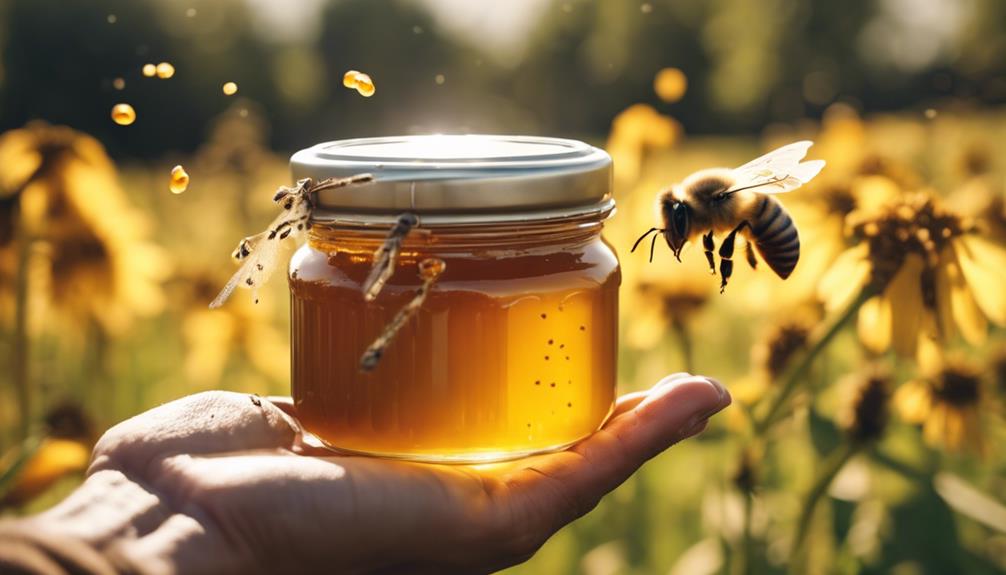
Understanding beekeeping practices is essential for consumers seeking ethically sourced honey. When it pertains to honey sourcing, consumer awareness plays a pivotal role in supporting bee welfare and sustainable practices. Here are three key points to ponder upon:
- Transparent Information: Small-scale beekeepers often provide detailed insights into their honey production methods, allowing consumers to make informed decisions.
- Locally Produced Honey: Choosing honey from local sources not only supports small-scale beekeepers but also guarantees fresher and more sustainable honey.
- Ethical Honey Sourcing: By prioritizing bee welfare and sustainability, consumers can contribute to the ethical production of honey while enjoying its benefits guilt-free.
Being aware of where your honey comes from and how it’s produced empowers you to make ethical choices that align with your values.
The Intersection of Veganism and Honey
When contemplating the intersection of veganism and honey, it’s crucial to investigate vegan honey alternatives and ethical honey production methods.
Some vegans choose locally-produced honey from beekeepers who prioritize the well-being of bees, aligning with their values.
The discussion surrounding the consumption of ethically sourced honey unveils a nuanced conversation within the vegan community.
Vegan Honey Alternatives
Exploring vegan honey alternatives reveals ethical and delicious options for those adhering to plant-based diets. Here are three fantastic choices to contemplate:
- Agave Nectar: This sweet syrup extracted from the agave plant is a popular vegan alternative known for its low glycemic index.
- Maple Syrup: Harvested from maple trees, this natural sweetener is a versatile substitute that adds a unique flavor profile to dishes.
- Date Syrup: Made from dates, this rich and caramel-like syrup offers a nutrient-packed option for sweetening your favorite recipes.
These plant-based honey alternatives not only avoid exploiting bees but also align with ethical consumption practices, making them perfect for vegans who value sustainability and compassion.
Ethical Honey Production
As we investigate the ethical production of honey and its connection to veganism, it becomes evident that prioritizing bee welfare is crucial in sustainable practices. Ethical honey production involves small-scale beekeepers who respect bee behavior, refrain from queen bee wing clipping, and employ natural beekeeping methods. These practices not only guarantee the bees’ health and survival but also contribute to sustainable beekeeping.
Choosing ethically sourced honey supports reducing harm and exploitation towards animals, aligning with vegan principles. By opting for honey produced through ethical means, we can actively participate in promoting bee welfare and supporting practices that respect the natural instincts of these crucial pollinators. Sustainable beekeeping not only benefits the bees but also upholds values of compassion and ethical treatment towards all living beings.
Making Informed Choices About Honey
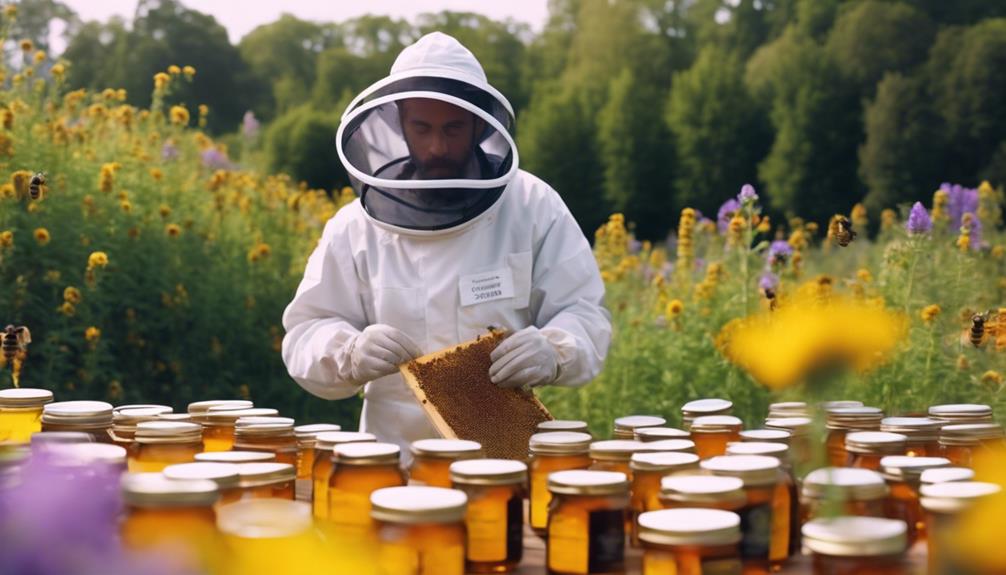
To guarantee ethical consumption of honey, we must carefully choose products sourced from beekeepers who prioritize the well-being and natural behaviors of bees. When making informed choices about honey, consider the following:
- Research beekeepers who practice sustainable methods that support bee welfare and natural behavior.
- Opt for honey from sources that avoid harmful practices like wing clipping and selective breeding.
- Support small, local beekeepers who treat their bees with respect and prioritize ethical sourcing.

Roger Thomas is a seasoned beekeeper and hive architect with a deep-seated passion for sustainable living. His fascination with bees has shaped his professional career, giving him practical and theoretical expertise in bee behavior, colony health, and optimal hive conditions. Roger’s technical skills shine in his bespoke hive creations that cater to the specific needs of diverse bee species, while his sustainable practices promote environmental balance and the wellbeing of the bee population.
As he continues his journey in beekeeping, Roger has become a dedicated advocate for responsible practices and an insightful educator in his field. His posts aim to inspire new beekeepers, underline the importance of sustainability, and showcase the remarkable contribution bees make to our ecosystem. Roger invites you to join him as he delves into the world of bees and the rewarding, honey-sweet art of beekeeping.
